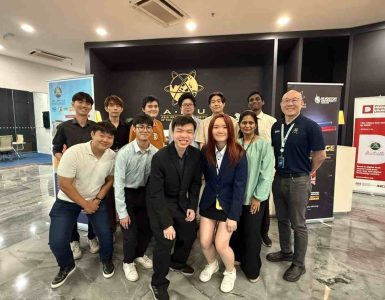University of Nottingham Malaysia (UNM) organised its second Food Security in Small Islands and Developing States (FSSIDS) 2022 conference, gathering expert minds from numerous countries.
According to the Food and Agriculture Organisation of the United Nations (FAO), the domino effect caused by the pandemic, climate change, rising prices and international tensions is impacting food systems across the globe.
The conference is in response to the FAO’s demand that we ‘leave no one behind’ with the #WorldFoodDay 2022 just around the corner, on 16 October.

Led by Associate Professor and Director of Sustainable Food Systems, UNM Future Food Malaysia, Dr Chin Chiew Foan, as Chair, and Research Manager, UNM Future Food Malaysia, Dr Goh Ee Von, as Co-Chair, the four-day conference was held to discuss the challenges each region and their respective food systems were facing.
“Food systems are extremely complex. We need to first understand the many players in that system, and what each of their roles are so that we can work collaboratively to address the problem. This isn’t about pinning the blame. We all have an equal role to play, and each of our actions can positively or negatively impact the global food system,” said Dr Chin.
Malaysia ranked 39th in the world and second in Southeast Asia in the Global Food Security Index (GFSI) by The Economist Intelligence Unit (EIU) for 2021. Nevertheless, upholding food security remains an on-going effort, especially with the recent shortage of chicken and food inflation rates at 4.1% higher than 2021.
To mitigate this, there should be more focus placed on the agricultural sector, such as through preservation of agricultural land and providing incentives and subsidies to farmers, fishermen and smallholders. This will also help to recognise the numerous players, big and small, who are involved in Malaysia’s own food system and realise the impact they will have in achieving the nation’s food security.
The State Of Food Security And Nutrition In The World publication by FAO in 2021 highlighted that one of the greatest challenges of achieving resilient food systems is that existing national, regional and global policies, strategies, legislation and investments are compartmentalised into distinct dialogues. Too many parties are working in silos when what the food system is in dire need of is an integrated approach.
Investments in food and agriculture research and development (R&D) is shifting heavily towards the Asia-Pacific region. As a result, the region is accounting for about half of the world’s spending on food and agriculture R&D, emphasising the need for better collaboration between parties.
FSSIDS 2022 makes one small step to addressing this by bringing people of differing expertise and nationalities into one room, to achieve one common goal. UNM intends to further its commitment in this area by setting up an FSSIDS network and holding more conferences in the future, to broaden the network of experts with opinions on the topic.
“This conference allowed us to better understand what problems other regions face and how they’re addressing them, if there’s similarities or differences in that sense, we can work together to overcome it. In being committed to producing global thinkers, UNM celebrates the efforts of those involved in FSSIDS 2022. We support the initiative and hope to see it make a difference not just in Malaysia or the Southeast Asian region, but across the world,” remarked UNM Vice Provost of the Research and Knowledge Exchange Hub (RKE), Professor Andy Chan.

UNM’s mission to break down silos on conversations around food security is in line with its commitment to address the United Nation’s Sustainable Development Goals (SDG), with a focus on SDG2, ‘Zero Hunger’ and SDG17, ‘Partnerships For The Goals’.
“Ensuring food security for everyone is central to addressing the other SDGs. Without proper access to nutritious food, we are already losing the fight,” said Dr Chin.
This #WorldFoodDay, UNM urges all parties along the value chain, from producers to consumers, to embrace and encourage conversations on food systems, and to start thinking about how operations, processes and consumption habits impact food security in the long term. Together, UNM believes communities and nations can achieve an inclusive and sustainable future for all.
FSSIDS 2022 was attended by about 50 academic and non-academic experts, from 11 countries, representing UNM; University of Nottingham, UK (UoN); University Tunku Abdul Rahman; National Research and Innovation Agency of The Republic of Indonesia; Khazanah Nasional Berhad; Revoganix Sdn Bhd; Universiti Putra Malaysia, GK Aqua Sdn Bhd; Fiji National University; Scientific Research Organisation of Samoa; UCSI University; Vietnam Academy of Agricultural Sciences; University Malaysia Sabah; Nanyang Technological University; University of the Philippines Open University; Murdoch University; Malaysian Agricultural Research and Development Institute; Australian Centre of Pacific Islands Research, University of the Sunshine Coast; Universiti Malaya; and Thammasat University.










